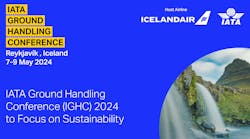Alexandria, VA - With the U.S. Department of Transportation today reporting more than $1.6 billion in additional bag fee and ancillary revenue flowing to airlines in the first quarter of 2015, the American Association of Airport Executives (AAAE) once again questioned the opposition of carriers to updating a local airport user fee known as the Passenger Facility Charge (PFC), last adjusted by Congress 15 years ago, that finances the construction of new runways, terminals and other airport improvements.
"It's hard to reconcile the aggressive resistance of the airline industry to calls from airports for self-help to modernize their facilities while the carriers continue to rake in billions annually in fees from passengers," AAAE President and CEO Todd Hauptli said today. "With Congress poised to consider transformational changes to the nation's aviation system, we need lawmakers to act in the long long-term best interest of local communities and the nation by modernizing the Passenger Facility Charge program."
According to data released today by the Department of Transportation's Bureau of Transportation Statistics, airlines collected more than $864 million in baggage fees and more than $764 million more in reservation change or cancellation fees in the first quarter of 2015. That follows a record $3.5 billion in bag fees and another $3 billion in reservation cancellation or change fees collected in 2014.
Since 2008, airlines have collected more than $21.8 billion in baggage fees and more than $17.8 billion extra in ticket change and cancellation fees. That total of nearly $40 billion in baggage and ticket change fees does not include other airline ancillary charges such as pet transportation, sale of frequent flyer award miles to airline business partners and standby passenger fees.
In comparison, airports collectively last year received less than $2.8 billion from the PFC, which is a charge that must be justified locally, imposed locally and used locally on FAA-approved projects that enhance local airport facilities. The federal cap on the local PFC has not been adjusted since 2000, and it has lost half of its purchasing power. The PFC is not a tax and never goes to the federal Treasury, according to the non-partisan Congressional Research Service. The $3.5 billion in bag fees airlines collected in 2014 also exceeds the $3.35 billion the federal government provided for airport grants at all eligible airports in FY 2015 through the Airport Improvement Program.
Because bag fees are not taxed at the same 7.5 percent excise tax rate applied to base airline tickets, the Airport and Airway Trust Fund lost $265 million in foregone revenue in 2014 alone. Since 2008, the $21.8 billion in bag fees that are not taxed have cost the Trust Fund more than $1.6 billion in lost revenue.
Hauptli discussed AAAE's support of closing the bag fee loophole at a Senate Commerce subcommittee hearing earlier this year. Hauptli told lawmakers that the foregone revenue from bag fees could help pay for airport infrastructure projects and air traffic control modernization. You can watch video of the hearing and read Hauptli's prepared statement here.
ABOUT AAAE: Founded in 1928, AAAE is the world's largest professional organization representing the men and women who work at public-use commercial and general aviation airports. AAAE's 5,000-plus members represent some 850 airports and hundreds of companies and organizations that support the airport industry. Headquartered in Alexandria, Va., AAAE serves its membership through results-oriented representation in Washington, D.C., and delivers a wide range of industry services and professional development opportunities, including training, conferences, and a highly respected accreditation program.




